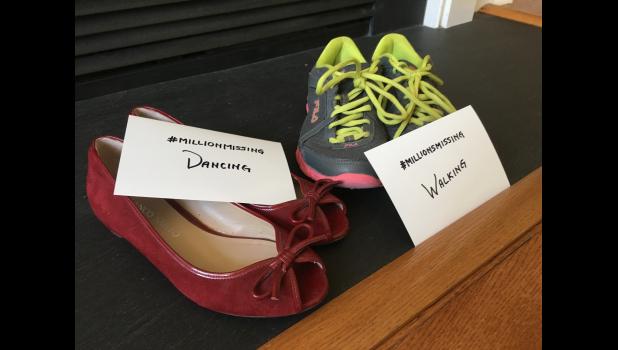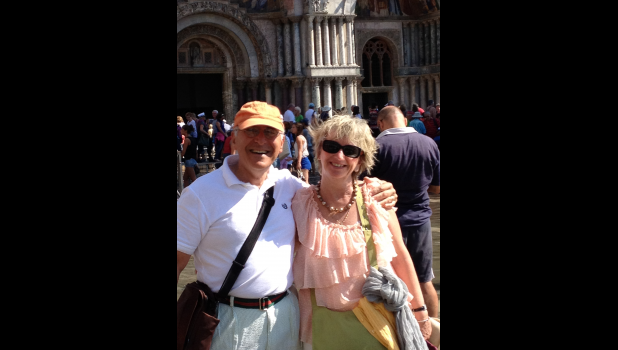'I've had to give up everything'
It’s a beautiful, warm spring day on Daniel Island and Sandra Jacobs is gazing longingly out of the windows in her Center Park home while resting on her living room couch.
Most people could easily get up and walk out the door to enjoy the outdoor splendor - and to complete most other normal tasks, such as going out to lunch with friends, taking a shower, or even reading a book. But for Sandra, a retired librarian and high school literature teacher, these activities are anything but easy. In fact, some days they are near impossible.
Sandra suffers from Myalgic Encephalomyelitis/Chronic Fatigue Syndrome (ME/CFS), a multi-system disease that causes dysfunction of the neurological, immune, endocrine and energy metabolism systems.
“Before this I was quite active,” says Sandra, tears welling up in her eyes. “I would walk four miles a week with my friends, loved to entertain and we traveled quite a bit.”
Sandra’s husband, Bob, her devoted caregiver, sits beside her as she discusses the ravages of her condition.
“You’re kind of trapped in your body,” he explains. “This isn’t the only illness that does that, but this is one that nobody knows about.”
A retired rheumatologist, Bob’s experience in the medical realm has been extremely beneficial in understanding the disease’s complexities as he offers support to Sandra. But the fact that very little information is known about the condition is frustrating, he concedes.
“Certainly, the etiology is not known,” says Bob. “And there are lots of abnormalities that can be tested, but there really is no cure…With this illness there are no FDA approved treatments.”
“What became clear is Chronic Fatigue Syndrome as a name is a bad name,” he continues. “Because if we would tell someone that Sandra has CFS, they would go ‘oh my, well I understand. I am so tired at the end of the day.’ Nobody means to, but it kind of trivializes what’s happening.”
Sandra’s first inkling that something was wrong came about eight years ago, when she and Bob were about to head into a performance at the Gaillard in downtown Charleston. She had been suffering from bronchitis and began coughing intensely and could barely catch her breath. Bob took her to the emergency room.
“Everybody thought at that time she had pertussis, whooping cough,” he says. “She did not.”
The coughing went away but Sandra had six months of new symptoms – profound fatigue, debilitating pain in her head, discomfort in the center part of her chest, and more. She was tested for a host of conditions, including cardiac, neurologic, autoimmune and endocrine disorders. All were negative. She was left with a diagnosis of an immunodeficiency and many unanswered questions.
“I don’t even remember two years of my life,” says Sandra. “I was just down.”
Bob became increasingly disappointed in the medical community, particularly given the belief among some that the condition is purely psychological and “all in a patient’s head.”
“This is a disease,” he says. “It’s biological. You would think physicians would respond to that…There is no question that patients with this disease are very likely to be depressed. But it’s not the disease that needs psychological intervention. The patient may need it, and that’s the patient’s call.”
But in 2014, they connected with Dr. Susan Levine, a physician in New York who was able to give Sandra’s condition a name - ME/CFS – and a place to focus their energies. Dr. Levine prescribed gamma globulin injections to boost Sandra’s immunity defenses. She was also found to have high titers of antibodies to Epstein-Barr virus (EBV).
“Most people have encountered EBV, but ME/CFS patients often test highly positive,” says Bob. “This has prompted a thought that EBV may have something to do with causality…But whether it’s EBV itself or an immune system problem is in the realm of theory.”
Four years after receiving the ME/CFS diagnosis, the Jacobs continue to try to etch out a normal life navigating Sandra’s condition. She must wear a heart monitor on her wrist to gauge her pulse and blood pressure, both of which can get out of whack due to the disease.
“Sandra’s illness waxes and wanes,” he says. “There are days that all she can do is lie there.”
“Bob does all the grocery shopping, all the cooking, all the laundry,” adds Sandra. “He does it all. I am very grateful for that. He makes a lot of plans. He helps me with all my medications.”
Some days she experiences light sensitivity and what she calls “brain fog,” in addition to her other symptoms. Exertion can make things worse, says Sandra, and if she gets any type of infection, especially one involving the upper respiratory system, it knocks her down for weeks. And the extreme tiredness is always a factor they must work around. Even brushing her teeth can be difficult, says Sandra.
“I used to love playing Mahjong,” she adds, referencing the popular tile-based game. “I was playing three times a week with different groups. And I loved riding my bicycle around and loved walking.”
She even had to stop caring for her granddaughter one day a week because it became just too much for her. Missing time with family members, combined with the social isolation that comes with the disease, has been hard to cope with.
“I’ve had to give up everything,” she says, her eyes moistening once again. “…Everything.”
And that experience of “missing out” is what has prompted both Bob and Sandra to take part in a global awareness campaign for ME/CFS known as #MillionsMissing. According to the website www.millionsmissing.org, those taking part in the initiative are demanding that the government “make a serious commitment to urgently address this disease” through new diagnostic testing, clinical trials and treatments. The condition affects up to 2.5 million Americans, is more prevalent in women than in men, is seen in children as young as 5, and affects all races, based on data provided by MEAction, an international network for ME sufferers. The personal and societal cost of the disease is estimated to be between $17 and $24 billion in medical expenses and lost productivity due to the patients’ inability to work.
Last Saturday, May 12, the #MillionsMissing movement took to the streets in cities all over the world to spread their message. Due to Sandra’s condition, the Jacobs were not able to physically take part. But Sandra took a photo of two pairs of shoes, one for dancing and one for walking, to post on her Facebook page in support of the campaign. They represent two activities she is missing out on because of ME/CFS. Other sufferers have posted similar photos to drive the message home.
“You look and they have nice fancy heels and scuba flippers,” says Sandra. “It shows that anybody can be impacted…and they don’t know why.”
“It would be incredible if the events of last weekend would get funding agencies to finally recognize and acknowledge the need to invest in this illness,” says Bob. “We’re talking about millions of people. We’re talking about millions of dollars lost. And probably more than that as an expense because of the medical needs of this illness. It’s extraordinary.”
In the meantime, Sandra has learned to make the most of each day, as best she can.
“I’m kind of over feeling sorry for myself,” she says, pausing before finishing. “Because…there have been a lot of tears.”
“It’s an illness that doesn’t get better,” adds Bob. “It hurts me to say it, but she has it and all we can pray for is a somewhat better day – and the longshot is a remission.”
This July, Bob and Sandra will be celebrating their 10th wedding anniversary by taking the whole family on a cruise. Sandra is looking forward to being present for the experience, as she is determined to not let her condition rob her of precious time with her loved ones.
“We’re excited,” she says. “I can get on a walker if someone pushes me and then I can go to a lounge chair so I can watch. I can still enjoy. I don’t have to go down the waterslide to have fun!”
For additional information on ME/CFS or the #MillionsMissing campaign, visit www.millionsmissing.org or www.meaction.net.


